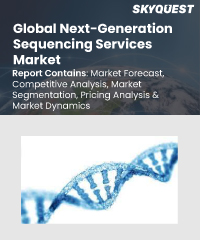
Report ID: SQSG35A2092

Report ID:
SQSG35A2092 |
Region:
Global |
Published Date: February, 2024
Pages:
157
|
Tables:
152 |
Figures:
78
Next-Generation Sequencing Services Market size was valued at USD 7.31 Billion in 2023 and is poised to grow from USD 8.96 Billion in 2024 to USD 30.03 Billion by 2032, growing at a CAGR of 22.56% during the forecast period (2025-2032).
Next-generation sequencing (NGS), also referred to as massively parallel sequencing (MPS) is used to refer to a DNA sequencing technology that has greatly benefited the disciplines of biotechnology, medical diagnosis, forensic biology, biological systematics, and virology. Clinical research, basic research, and applied science have all transformed as a result of the development of NGS. With the next-generation sequencing technology, a full human genome can be sequenced in a lot less time than with the older Sanger sequencing technology. The order of nucleotides throughout the genome can be determined quickly, scalable, and with a very high throughput. DNA pre-sequencing is one of the most crucial steps in the entire sequencing methodology since it includes preparing the material for the subsequent sequencing reaction. NGS is increasingly being used in clinical laboratory analysis, testing, and illness diagnosis across the globe. The drug discovery process in pharmacogenomic is frequently accelerated using next-generation sequencing (NGS).
The identification of biomarkers for early diagnosis and individualised treatments is made possible by next-generation sequencing, which has had a substantial impact on the shift from the traditional medical model of diagnosis to a precision medicine model. Although Next Generation Sequencing is a relatively new technology, it has already made major contributions to molecular biology, genetics, and the disciplines of personalised medicine, hereditary illnesses, and clinical diagnostics.
US Next-Generation Sequencing Services Market is poised to grow at a sustainable CAGR for the next forecast year.
Our industry expert will work with you to provide you with customized data in a short amount of time.
REQUEST FREE CUSTOMIZATIONWant to customize this report? This report can be personalized according to your needs. Our analysts and industry experts will work directly with you to understand your requirements and provide you with customized data in a short amount of time. We offer $1000 worth of FREE customization at the time of purchase.

Report ID: SQSG35A2092